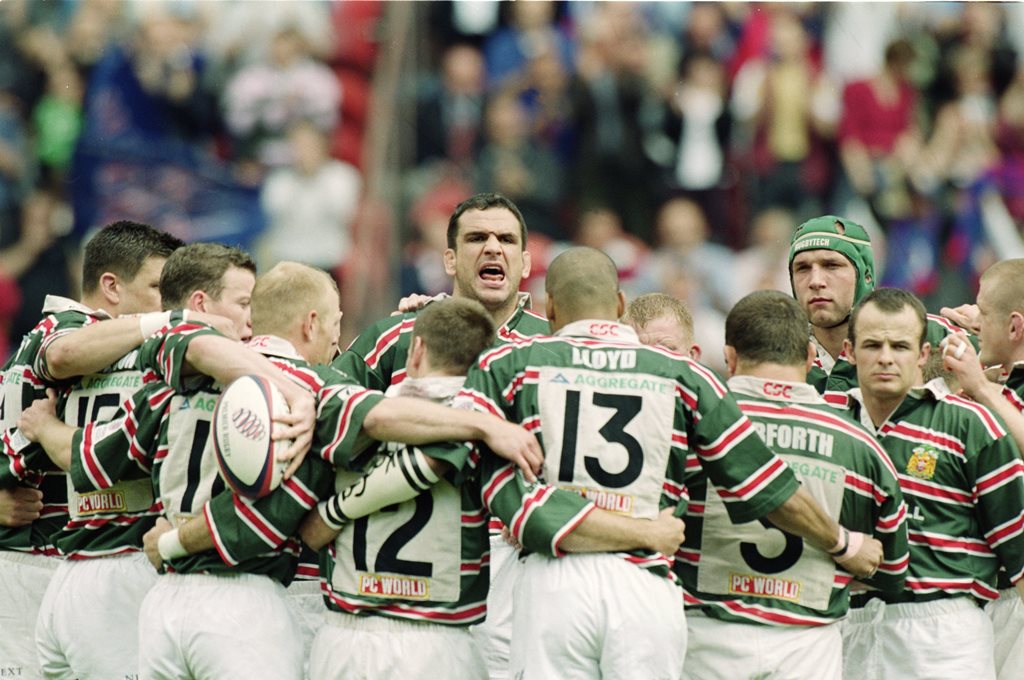Cain column: Oh, for the leadership of Lawrence and Johnno

(Photo: Getty Images)
By Nick Cain
A lack of leadership was an area that Eddie Jones identified immediately as being an Achilles heel of English rugby soon after he had taken stock of the players available to him. Two years on and the record losing streak by Premiership clubs in the European Cup last weekend – when all seven went down – provided a strong indication that nothing much has changed.
With the exception of Bath’s narrow defeat in Toulon – where their captain Matt Garvey led from the front – the lack of flinty, tactically streetwise leadership was laid bare by the floggings handed out to the Premiership sides.
The days when icons like Lawrence Dallaglio, Martin Johnson and Tim Rodber took their teams to foreign fields and relished the prospect of testing their competitive steel – showing not just their physical and mental strength but their nerve and nous – seemed to be something from a bygone era rather than a trait embedded in the culture of English clubs.
It is difficult to envisage a Wasps side with the bristlingly combative Dallaglio as its captain allowing La Rochelle the same leeway that Joe Launchbury‘s outfit gave them on the French Atlantic coast last weekend.
Sure, La Rochelle have a juggernaut pack, and are the talk of the Top 14. That is exactly what Perpignan were when Wasps faced them in the pool round in 2004. The Stade Aime Giral was a forbidding ground littered with the bones of adversaries who had the temerity to think that they could storm the Perpignan fortress.
Instead, they ended up being crushed by the power and aggression of the fearsome ‘blood and gold’ pack.
Dallaglio and company not only scaled the walls, they sacked the place, hammering Perpignan 34-6. They were a side with great individual ability, just like the current Wasps side, but, more than that, they had and unbending collective will.
With Dallaglio leading the charge, and the likes of Trevor Leota, Joe Worsley, Simon Shaw, Fraser Waters and Josh Lewsey in close support, their refusal to be intimidated by the hostile atmosphere or the opposition is the starting point for any side which would be champions.
Wasps rugby director Dai Young could do worse than show the tape of that match to his current crew – and the same is true for his counterparts at other Premiership clubs. For the record, that Wasps side went on to win their first European Cup final, beating Munster in the semi-final and Toulouse in the final, both of them epics.
The same is true of Johnson’s Leicester, who won more than they lost against Munster, and were never dised by the sort of 33-10 scoreline we saw at Thomond Park last weekend. There was nothing implacable about Tom Youngs and his Tigers pack, and just as disappointingly neither Ben Youngs nor his England half-back partner George Ford provided any sort of coherent tactical leadership.
The most stunning English defeat was Clermont’s 46-14 demolition of Saracens in their postponed encounter at Allianz Park – and again, leadership was in the spotlight when the captain of the European champions, Brad Barritt, was forced off after just three minutes.
Barritt has been a defensive linchpin for Saracens for as long as he has been at the club, but the way their defence collapsed when he left the field was something that will have given their rugby director Mark McCall sleepless nights.
Saracens pride themselves on their collective strength, especially their Wolfpack mentality in defence, which by now McCall must have believed was ingrained.
However, despite Owen Farrell taking over the captaincy, it fell apart, with Saracens missing 37 tackles as Clermont filled their boots. Farrell is being touted as a future England captain, but for that to become a reality he will have to show more signs of leadership than he did in this instance.
It was a similar story at the Twickenham Stoop where Chris Robshaw’s early departure following a head injury appeared to leave Harlequins rudderless against Ulster, with regular skipper Aussie James Horwill also absent.
At Franklin’s Gardens it was less about injuries than about application, with Northampton on the receiving end of a drubbing by the Ospreys until a late revival – which coincided with Mike Haywood replacing Dylan Hartley at hooker – giving them a semblance of scoreboard respectability.
My view is that the lack of leaders in the English game is damaging, and self-inflicted. Leadership in rugby is not about having committee meetings, nor about having five co-captains, and umpteen players in your ‘leadership group’. It’s about having one bloke, whose instinct is to lead from the front and who is a first choice certainty in his position, calling the shots on the field. To do so he requires confidence, a good knowledge of the laws, and a good sense of judgement.
There is a simplicity about good captaincy – the sort where Martin Johnson would throw the ball to Jonny Wilkinson and say, “three points, Jonny”, rather than have a tripartite conversation with co-captains and water- carriers about whether to kick a penalty.
It is the half-baked ‘consultative’ route to captaincy that has resulted in the lack of leadership we saw from English clubs on their Round 3 European Cup no-show.